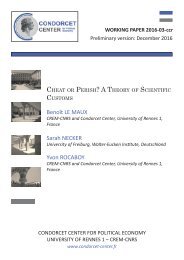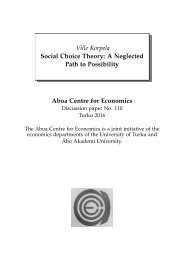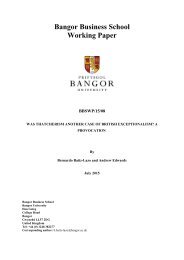MEMORANDUM
n?u=RePEc:hhs:osloec:2016_018&r=hpe
n?u=RePEc:hhs:osloec:2016_018&r=hpe
You also want an ePaper? Increase the reach of your titles
YUMPU automatically turns print PDFs into web optimized ePapers that Google loves.
As the candidate remarks, this impossibility would happen the earlier the<br />
stronger the productivity increase would have been. Yes, it can easily be shown that<br />
in his numerical example a doubling of the productivity of the first good will<br />
already at the end of the following period lead to a standstill of the entire<br />
production process. This would mean that when an economic resource starts to<br />
flow in sufficient magnitude it must lead to paralysis of the economy. The<br />
abstrusity of such a conception is close at hand. It is obviously a flight of fancy and<br />
the Leontievian “pendular movement” is no less so: it is admittedly correctly<br />
derived logically and arithmetically, however, under assumption that strikes reality<br />
in the face: in the derivation it is assumed that the economy rather collapses than<br />
leaving a good unutilized, and that the productivity coefficients are under all<br />
circumstances maintained.<br />
Unrealistic is also the treatment the candidate offers of the problem of<br />
exchange. His criticism of Irving Fisher’s contraposition of capital and income is<br />
largely misguided. His “third” concept of the velocity of money is untenable. In<br />
general it must be stated that his remarks are in part incomprehensible. The<br />
notation he makes use of is sometimes unusual and inappropriate.”<br />
Bortkiewicz described and commented the content of the dissertation with a slight<br />
ironic distance. He was hardly been convinced about the benefits of the system developed<br />
by Leontief. He acknowledged the effort and the ingenuity demonstrated by Leontief in<br />
the concluding paragraph.<br />
Although the second part of the work may have some sensitive formal shortcomings<br />
and materially little to offer as the results of the theoretical investigation at best<br />
stand in a remote relation to reality, but as a specimen of scientific aptitude and the<br />
erudition of the author this part must not be underestimated. He proceeds<br />
throughout in correct style, mostly correct reasoning and always independent,<br />
although not without strange ideas whether in an explicit position, or whether in<br />
mere suggestions to take into account.<br />
In my assessment the dissertation deserves to be marked as opus laudabile.”<br />
10 January 1928 signed L. v. Bortkiewicz<br />
Bortkiewicz’ evaluation and marking was cosigned by Sombart with a single<br />
minimalistic remark that he accepted the mark (“Mit dem Prädikat einverstanden”).<br />
At this stage only the oral exam (Promotionsprüfung) remained. It was decided to take<br />
place on 1 March 1928. The Promotionsprüfung was a thorough test, conducted as an oral<br />
exam over one day on 1 March 1928 with four examiners, three of them his teachers<br />
Bortkiewicz, Sombart, and Breysig, The fourth examiner was Köhler, a philosopher. All<br />
37





